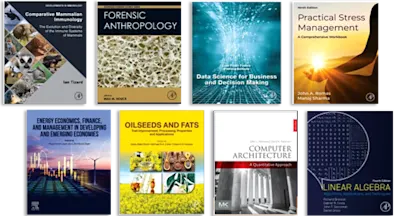
American Criminal Courts
Legal Process and Social Context
- 1st Edition - April 5, 2013
- Imprint: Anderson
- Authors: Casey Welch, John Randolph Fuller
- Language: English
- eBook ISBN:9 7 8 - 1 - 4 5 5 7 - 2 8 1 1 - 4
American Criminal Courts: Legal Process and Social Context provides a complete picture of both the theory and day-to-day reality of criminal courts in the United States. The book… Read more
Purchase options

American Criminal Courts: Legal Process and Social Context provides a complete picture of both the theory and day-to-day reality of criminal courts in the United States. The book begins by exploring how democratic processes affect criminal law, the documents that define law, the organizational structure of courts at the federal and state levels, the overlapping authority of the appeals process, and the effect of legal processes such as precedent, jurisdiction, and the underlying philosophies of various types of courts.
In practice, criminal courts are staffed by people who represent different perspectives, occupational pressures, and organizational goals. Thus, this book includes chapters on actors in the traditional courtroom workgroup (judges, prosecutors, and defense attorneys, etc.) as well as those outside the court who seek to influence it, including advocacy groups, the media, and politicians.
It is the interplay between the court's legal processes and the social actors in the courtroom that makes the application of criminal law fascinating. By focusing on the tension between the law and the actors inside of it, American Criminal Courts: Legal Process and Social Context demonstrates how the courts are a product of "law in action" and presents content in a way that enables you to understand not only the "how" of the U.S. criminal court system, but also the "why."
- Clearly explains both the principles underlying the development of criminal law and the practical reality of the court system in action
- A complete picture of the criminal justice continuum, including prosecution, defense, judges, juries, sentencing, and pre-trial and appeals processes
- Feature boxes look at how courts are portrayed in the media; identify landmark due-process cases; illustrate the pros and cons of the courts’ discretionary decision-making; examine procedures and the goals of justice; and highlight the various types of careers available within the criminal courts
This book can be used in brick-and-mortar and online courses, and across disciplines, including criminal justice and criminology, pre-law, sociology, and political science. This includes 2-year and 4-year traditional schools and career schools, as well as graduate schools, and courses such as Criminal Court Process and System, Courts and Sentencing, and Introduction to Courts.
Chapter 1: Principles and Decision Making in U.S. Criminal Courts
Part 1: Formal Social Control
Chapter 2: Social Control, Comparative Courts, and the Development of the U.S. Judicial System
Chapter 3: The Structure of Federal and State Courts
Chapter 4: Criminal Law, Crime, and the Criminal Court Process
Part 2: Negotiating Discretion, Making Decisions
Chapter 5: The Reality of Legal Action: Principles, Organizations, and Public Pressure
Chapter 6: Case Assessment, Case Attrition, and Decision to Charge
Part 3: Decision Making in the Pretrial and Trial Process
Chapter 7: The Pre-Trial Process
Chapter 8: The Prosecutor and the Exertion of State Power
Chapter 9: The Defense and Constraint on State Power
Chapter 10: The Criminal Trial Process: Judges, Bench Trials, Jury Deliberation, and Sentencing
Part 4: Specialized Courts
Chapter 11: The Right to Appeal and the Appellate Process
Chapter 12: Juvenile Courts
Chapter 13: Specialized Courts
Part 5: Frontiers of Justice
Chapter 14: Fuzzy Justice: Alternatives to Court
Chapter 15: Courts in the Future
- Edition: 1
- Published: April 5, 2013
- Imprint: Anderson
- Language: English
CW
Casey Welch
JF
John Randolph Fuller
In addition to numerous journal articles and book chapters, Fuller has published six books on topics ranging from juvenile delinquency to peacemaking criminology. He is a frequent presenter at meetings of both the American Society of Criminology and the Academy of Criminal Justice Sciences. Additionally, he serves as the Faculty Ombuds at the University of West Georgia, where he endeavors to resolve conflicts for faculty, students, and administrators.